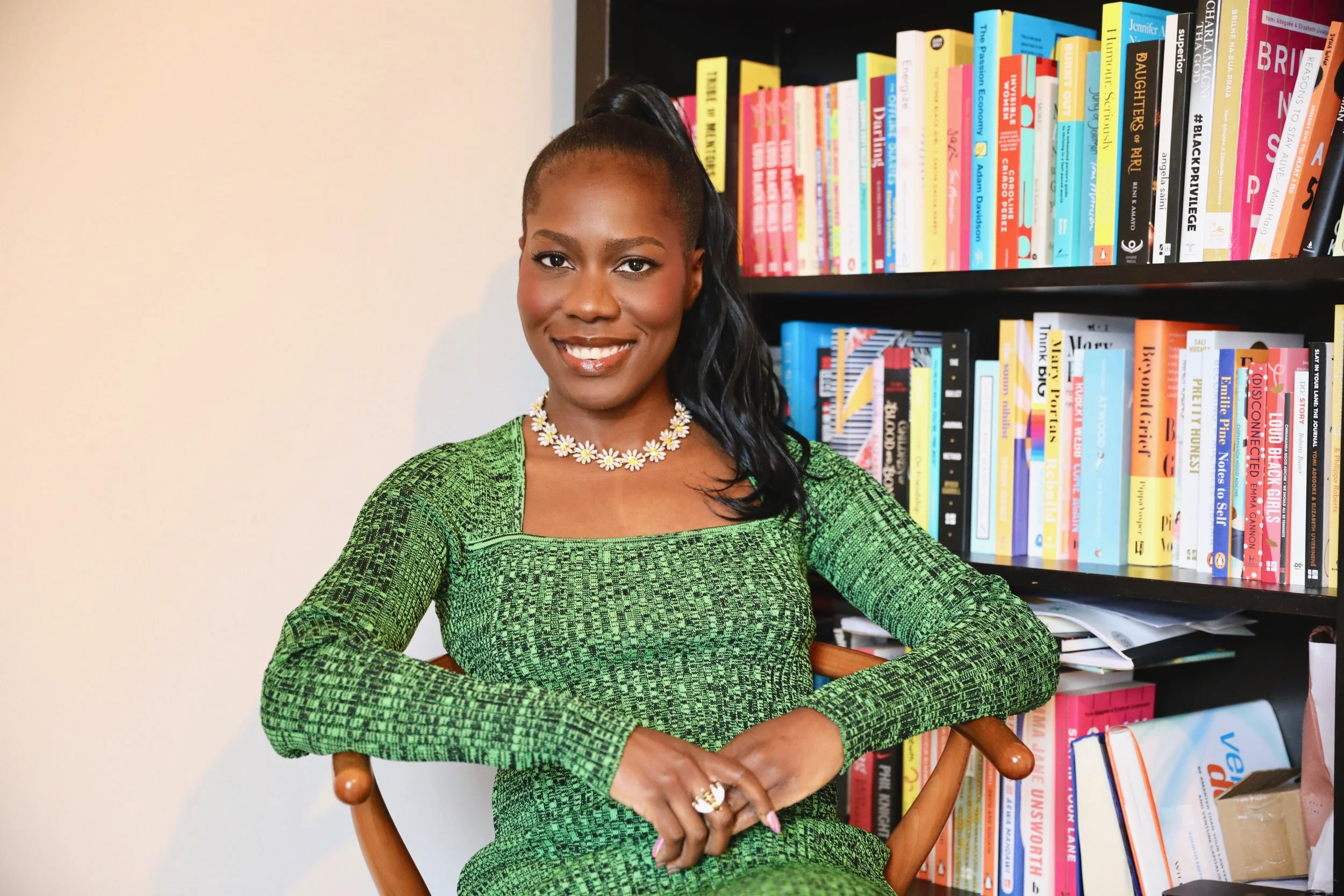Turning Your Vision Into a Business, with Elizabeth Uviebinené
💸 Welcome back to The Entrepreneur's Blueprint - a podcast series featuring three stories from female founders. In this second episode, I talk to Elizabeth Uviebinené, multi-award-winning author of five books and Founder of journaling app Storia. Discover how she develops resilience and vision to build her brand, raise money, and make bold moves to create a category-defining product.
You can listen (42 min) and subscribe here:
Now available on: Apple Podcasts | Spotify | Podlink
***
Here are some key takeaways from the discussion:
1. THE SPARK BEHIND STORIA
Elizabeth’s lightbulb moment for Storia came from her years as an author. She often found herself chatting with people who were searching for clarity and confidence, unsure of their next step in life. What she realised was that the answers were usually already there, buried within them, just waiting to be uncovered. And that’s where journaling comes in. Having used it herself to navigate tough times, she knew the power of putting pen to paper—or, in Storia’s case, fingers to screen. Storia was born out of her desire to create an easy and enjoyable way for people to journal their way to clarity, reminding them that the answers they’re looking for are often already inside.
Elizabeth Uviebinené
"I wanted to build a journaling app that helps you recognise that you have all the answers within yourself."
2. tHE IMPORTANCE OF CONVICTION
Before sharing her idea for Storia with anyone, Elizabeth focused on building her own personal conviction. She believes that conviction is the foundation of any successful business because, without it, it’s easy to get derailed by the opinions of others. For Elizabeth, this meant spending a lot of time journaling her thoughts, fears, and hopes. Writing things down allowed her to refine her goals and strengthen her belief in what she wanted to achieve. She emphasised that this personal conviction is critical for any entrepreneur, especially when things get tough. It’s what keeps you going when doubt creeps in or when the road ahead seems unclear. Elizabeth’s conviction in her vision for Storia gave her the confidence to face challenges head-on, knowing that her “why” was strong enough to keep her moving forward.
"What works for me won’t work for everyone else. When it comes to raising money, it’s important to read and listen to different stories from various entrepreneurs because everyone’s fundraising journey is different. There are so many types of capital, including grants you can apply for. My experience was unique—I was fortunate to have friends who were my first investors. Before I even spoke to a VC, I had already raised around £80k from just three people. But again, everyone’s journey is different."
3. BRINGING IDEAS TO LIFE WITH VISION BOARDS
Elizabeth didn’t just dream up the concept for Storia—she made it visual. One of the first things she did was create a vision board, using Pinterest to gather ideas on what her brand might look and feel like. From colour palettes to typography, Elizabeth curated every detail to help shape the identity of Storia. For her, this process was about more than just aesthetics—it was about making the abstract tangible. By creating a visual representation of her ideas, she found it easier to stay motivated and focused on her goals. She believes that having a vision board helps entrepreneurs keep their inspiration alive, especially during the early stages when the path can seem uncertain. It’s a way of turning your dreams into something you can see and feel, making them more real and achievable.
“By virtue of having a startup or a business, you are solving a problem that you probably see that other people don't. So, you have to almost create your own playbook. I'm a big believer in doing that both in life but also in business.”
4. LEARNING AS YOU GO
As a first-time tech founder, Elizabeth had a lot to learn, especially about the technical side of building an app. But instead of being intimidated by the challenge, she embraced it with curiosity and determination. She likened herself to a “sponge,” soaking up as much knowledge as she could about coding, tech stacks, user experience, and design. In the early days of Storia, Elizabeth was involved in every aspect of the business, from product development to branding, even if it meant learning entirely new skills on the fly.
She described the experience as being similar to a conductor leading an orchestra—she didn’t need to be an expert in every instrument, but she was responsible for making sure that everything came together in harmony. Her approach to learning as she goes reflects her belief that entrepreneurs don’t need to have all the answers at the start—they just need the willingness to dive in and figure things out along the way.
5. tHE IMPORTANCE OF MENTORSHIP
Throughout her journey, Elizabeth relied on the support of mentors to steer her through the highs and lows of entrepreneurship. For her, having people in her corner wasn’t just about seeking advice; it was about finding those who could challenge her thinking and offer fresh perspectives. Mentorship, in Elizabeth’s view, was never a one-way street. It was about building relationships that offered mutual value, where both sides could learn and grow. She made it a point to seek out mentors from different industries, understanding that sometimes the best insights come from completely outside your own world. These diverse relationships have been instrumental in helping her navigate the ever-evolving challenges of tech and business, providing her with a compass when the path wasn’t always clear.
Storia app | Find Your Inner Voice
"I'm not an expert in everything I have to come across, but I am a visionary. I can see the bigger picture, and I need to see the bigger picture. Some days I can't, because I'm so deep in things like coding with the team. We'll jump on calls, they share their screen, and while I might not understand the code, I understand how things should look, how they should feel, every little button, and the overall product experience."
6. THE REALITY OF FINANCIAL SACRIFICES
Building a business from the ground up comes with its own set of financial challenges, and Elizabeth was no stranger to them. To get Storia off the ground, she bootstrapped the business, using her own savings to fund development, hire freelancers, and cover early-stage costs.
For a long time, she didn’t take a salary, choosing instead to reinvest everything into the business. Knowing that every penny counted, she gave up personal luxuries, like holidays and splurges. It wasn’t glamorous, but it was necessary. Elizabeth knew that the sacrifices she made today would pay off in the future. She understood that building something meaningful often requires temporary discomfort, but it’s that belief in her vision that kept her going.
"I think the first thing I would say as a founder is you’re a sponge. You’re just absorbing different types of things, and it’s your job to prioritise what things that you should be doing, what you shouldn’t be doing."
7. STAYING OBSESSED WITH YOUR VISION
It’s easy to get distracted when you’re building a business, especially with everyone offering their two pence on what you should be doing. But Elizabeth stayed laser-focused on her vision for Storia. She knew what she wanted the app to achieve and remained committed to that idea, no matter the noise around her. This obsession with her vision acted as her anchor, guiding her through difficult decisions and keeping her on track. It wasn’t about shutting out feedback—it was about filtering it through the lens of her goals. Elizabeth’s unwavering focus ensured that Storia remained true to its core purpose, even as it grew.
"I would say telling yourself stories is different because you, as a founder, as a business person, have to tell yourself stories about why this future that you are building should exist, why your vision is the right vision. You have to believe in that. You have to believe in that, so you tell your team, you believe in that, so you speak to your investors, believe in that."
8. bUILDING A CATEGORY DEFINING PRODUCT
Creating Storia wasn’t just about filling a gap in the market—it was about building something entirely new, something that hadn’t been done in quite the same way. Elizabeth wanted Storia to stand out as a category-defining product in the journaling space. This meant understanding what users needed and delivering a solution that felt both innovative and personal. She poured herself into research, gathering feedback and insights to refine the product. For Elizabeth, success wasn’t just about creating another app—it was about creating a tool that would genuinely change how people engage with their own personal growth.
9. THE VALUE OF PERSONAL BRANDING
Elizabeth has always been aware of the power of personal branding, and as a founder, it became even more important. Building a business is one thing, but building a personal brand alongside it can open doors, attract investors, and build trust with your audience. Elizabeth has spent years crafting her personal brand, not as a self-promotion tool, but as a way to share her authentic self and connect with people on a deeper level. Through her writing, speaking engagements, and presence online, she’s cultivated a brand that reflects her values, her journey, and her passion for empowering others. It’s not just about being known—it’s about being known for something that truly matters.
"You have to be prepared for the financial sacrifices that come with starting a business. For me, it meant using my savings, cutting back on luxuries, and putting everything into Storia."
10. MANAGING PERSONAL FINANCES WHILE BUILDING A BUSINESS
Running a business often means making tough choices about personal finances, and Elizabeth didn’t shy away from sharing her experience. She knew from the start that building Storia would require financial discipline and a lot of personal investment. She was meticulous in managing her money, planning out how long she could sustain herself without taking a salary and being prepared for the lean times. It wasn’t just about sacrifice—it was about being smart and strategic, ensuring she had enough runway to keep going while also staying true to her vision. For Elizabeth, financial stability meant freedom—the freedom to invest in her dream without worrying about day-to-day pressures.
PARTNER
We use Fiverr to find freelancers with specialist skills; it’s like a talent cloud that we can tap into whenever we need extra help. Fiverr is all about democratising access to talent so that anyone can grow their business, brand, or dreams. Whether you’re a freelancer looking for work or a business looking for help, check out Fiverr today: https://www.fiverr.com/
RESOURCES
Storia: https://www.storia.world
Elizabeth Uviebinené’s Insragram: https://www.instagram.com/elizabethuviebinene/


